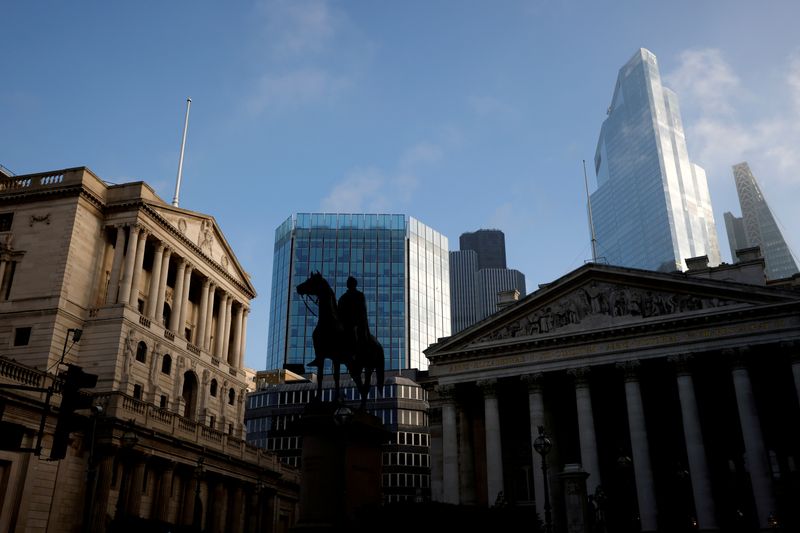
© Reuters. FILE PHOTO: A general view shows The Bank of England and the City of London financial district in London, Britain, November 5, 2020. REUTERS/John Sibley/File Photo
SHCAY
+0.55%
Add to/Remove from Watchlist
Add to Watchlist
Add Position
Position added successfully to:
Please name your holdings portfolio
Type:
BUY
SELL
Date:
Amount:
Price
Point Value:
Leverage:
1:1
1:10
1:25
1:50
1:100
1:200
1:400
1:500
1:1000
Commission:
Create New Watchlist
Create
Create a new holdings portfolio
Add
Create
+ Add another position
Close
By David Milliken and Huw Jones
LONDON (Reuters) -The Bank of England warned on Tuesday about “significant pressure” on households and businesses due to higher inflation and borrowing costs, but said they were more resilient than before the global financial crisis.
The BoE has previously flagged that Britain was entering a lengthy recession, and with inflation at a 41-year high and a sharp rise in interest rates over the past year, government forecasters have predicted a record squeeze on living standards.
“Falling real incomes, increases in mortgage costs and higher unemployment will place significant pressure on household finances,” the BoE said in its half-yearly Financial Stability Report.
Around 4 million households were likely to face higher mortgage payments in 2023, with the average monthly mortgage payment rising to 1,000 pounds ($1,228) from 750 pounds, equivalent to about 17% of pre-tax income.
But 2.4% of households would find themselves with mortgage payments that they would find hard to afford, the BoE’s Financial Policy Committee (FPC) predicted.
Compared with during the 2008 global financial crisis and the recession in the early 1990s, this was a smaller proportion, in part because more households have fixed-rate mortgages and lending regulations are stricter than in earlier decades.
“The FPC continues to judge that banks are resilient, even if conditions were to be worse than forecast,” BoE Governor Andrew Bailey wrote in a letter to finance minister Jeremy Hunt accompanying the report.
The FPC also announced it would conduct its first “stress test” of the non-banking sector following a near meltdown in pension funds in September.
SLOWING HOUSING MARKET
Britain’s housing market is already starting to slow in the face of higher interest rates and an incipient recession.
Mortgage lender Halifax reported the biggest monthly house price fall since 2008 in November, and trade body UK Finance forecast on Monday that lending for house purchase would fall by almost a quarter next year.
The BoE also warned of an increased danger of global financial risks crystallising.
“Sharp (OTC:SHCAY) increases in prices, including of energy, tighter financial conditions and the worsening outlook for growth and unemployment will continue to weigh on debt affordability for households, businesses and governments globally,” the BoE said.
The central bank warned in particular of the dangers of investing in crypto assets, which it said would benefit from “enhanced regulatory and law enforcement frameworks”.
“Financial institutions and investors should take an especially cautious and prudent approach to any adoption of these assets until the necessary regulatory frameworks are in place,” it said.
The BoE judged the risk of a sharp loss of investor appetite for British assets such as government bonds as “low”, as turmoil had eased since September’s mini-budget from Liz Truss’s short-lived government.
“Perceptions of the UK macroeconomic policy framework can have a material impact on UK financial conditions,” it said.
($1 = 0.8141 pounds)
Source: Investing.com






























